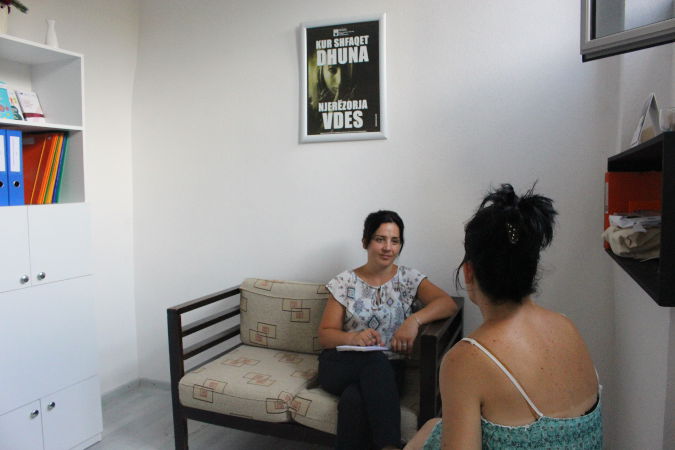Improving services for women survivors of violence in Albania
Date:

“More violence at home! Today my son-in-law grabbed my daughter by the hair and started hitting her; I had to struggle hard to get him off her”, Lumnie Shima’s* mother wrote in her diary in 2015, keeping notes of events in her house. The violence became more frequent, filling up the pages over the next few years. Then, at the end of 2017, Ms. Shima decided to report her husband to the police in Kamza, a municipality only 10 kilometers away from the capital of Albania.
“I felt broken, not only from the physical violence, but mainly because of the psychological abuse. I was deeply depressed. I wasn’t taking proper care of my children. When I was pregnant with my second child, he made my life a living hell”, Lumnie Shima recalls. At the time she was living together with her husband and their two children in her mother’s house.
Even though Ms. Shima eventually reported him to the police, she was not granted a protection order until the abuse happened again six months later. This time, the police put her in contact with Borjana Korumi, the coordinator of a UN Women-supported initiative that aims to improve the capacity of service providers for women survivors of violence. Since January 2018, Ms. Korumi has been assisting her and many other survivors in Kamza, referring them to the relevant institutions, according to their needs.
The project is being implemented by the Human Rights in Democracy Centre (HRDC) and the Shelter for Abused Women and Girls in the municipalities of Kamza and Lezha. It is one of six projects in Albania that are part of the regional programme on Ending Violence against Women in the Western Balkans and Turkey – implemented by UN Women with the support of the European Union.
I now have a one-year protection order and the centre is assisting me with the divorce process. Now that I have their support, I feel stronger and more confident”.
The HRDC is the only organization assisting survivors of domestic and gender-based violence in Kamza – the municipality has the second highest number of reported cases of domestic violence in the Tirana region.
“We are also working to increase the capacities of public institutions and inform them about their role and responsibilities in offering effective services to survivors of domestic violence. What we are doing now should be done by these institutions in the future. If they follow the right procedures, the system will be sustainable, and there won’t be a need to rely on us anymore”, says Ms. Korumi.
Thanks to the programme, more than 200 police officers, health centre employees, local administration staff and teachers have been trained to provide high-quality services for women survivors of violence and domestic violence, in accordance with national domestic violence legislation, as well as the CEDAW Convention and the Istanbul Convention.
Through community meetings in rural and urban areas of Kamza, around 120 women and girls, including from Roma and Egyptian communities, have increased their awareness of the different forms of violence, the services on offer for survivors and national legislation on violence against women.
In addition, the project is supporting the municipality to revitalize referral mechanisms for cases of domestic violence and to more effectively coordinate all the actors involved in the process.
“Since we started to work on this project, you can clearly see the increasing number of cases being reported to the police; more women are obtaining restraining orders or being assisted through the referral mechanism. Up until August this year, 82 cases have been registered by the police, compared to 52 for the same period last year”, says Ms. Korumi.
“The management of cases of violence is a complex process that requires a coordinated response from professionals across sectors, including the police, health, education, the judiciary and local government. HRDC and other UN Women partner organizations are doing a great job in supporting providers of all services for women survivors of violence, to help them fulfil their obligations in accordance with the law,” says Agustela Nini-Pavli, UN Women Project Analyst.
Esmeralda Troci, Domestic Violence Coordinator for the Municipality of Kamza, notes that the treatment of cases of violence has radically increased following the establishment of the referral mechanism in April this year. “There is closer inter-institutional coordination for cases of domestic violence. Meetings are held periodically on a case-by-case basis to assess the work done and identify the issues and challenges for each case. This has led to more effective assistance for survivors of domestic violence, in terms of their reintegration and rehabilitation.”
In Kamza, many women and girls have experienced domestic abuse, which is deeply rooted in patriarchal traditions and customs. Women’s socioeconomic conditions, poor levels of education and – in particular – harmful gender stereotypes, prevent them from reporting violence.
Ms. Shima was concerned what people would say about her separation from her husband – a fear she shared with her co-workers, many of whom have suffered domestic abuse. She admits that many women in the area have experienced domestic violence. However, they see it as normal and continue to suffer in silence. “I talk to them and explain that this is not how they should live. They should raise their voice. I raised mine and now I feel reborn; I have a new life ahead of me.”
*Name changed to protect the identity of the individual.